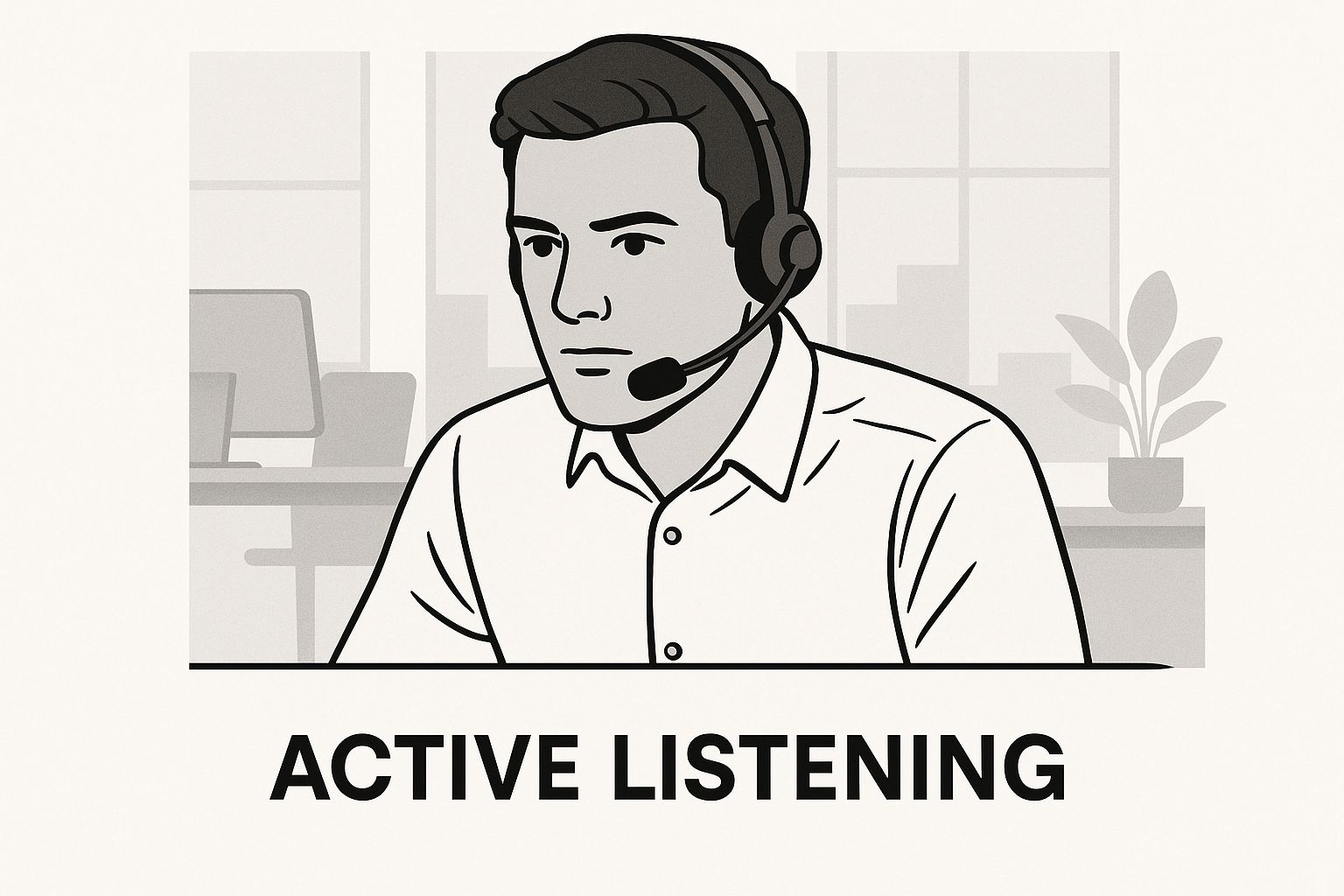The job of a call center agent has changed dramatically over the years. Long gone are the days of simply answering phones. Today’s agents are on the front lines, acting as brand ambassadors and expert problem-solvers who navigate customer conversations across a whole host of channels.
It's a role that demands a unique blend of technical know-how and genuine human empathy, all aimed at boosting customer satisfaction and loyalty.
The True Role of a Modern Call Center Agent

If you're picturing someone chained to a single phone line, it's time for an update. A modern agent is more like an experience architect, tasked with building trust and positively shaping the entire customer journey. Their responsibilities now span a wide spectrum of interactions, a direct reflection of rising customer expectations and the technology built to meet them.
This evolution is especially clear in fast-growing markets. Take the UAE and the broader Middle East, where the contact center outsourcing market has ballooned to $2.1 billion. This growth is fueled by inbound services that require skilled agents to handle a massive volume of inquiries coming in through voice, email, and social media.
An agent's true responsibility isn't just to close a ticket. It's to strengthen the customer relationship with every single interaction, turning potential problems into moments that build loyalty.
Understanding how to build the right team is crucial for meeting these new demands. Exploring different strategies, like the best practices for hiring remote customer support representatives, can offer valuable insights, as the required skills often change based on a company's specific needs.
Ultimately, the position is a balancing act between efficiency and empathy. For a deeper dive into what it takes, take a look at our complete guide on https://cloud-call-center.ae/2025/08/02/call-center-agents/ and their vital function in today's business world.
What Does a Call Center Agent Actually Do All Day?
When you break it down, a call center agent's job is all about communication. But what does that really mean in practice? The day-to-day responsibilities are a mix of direct customer conversations, careful record-keeping, and sticking to company communication guidelines.
Think of an agent as a kind of air traffic controller for customer issues. Their main job is to manage the constant flow of inbound calls from customers needing help and outbound calls for things like sales, surveys, or follow-ups. This means they have to answer questions promptly and professionally, making every customer feel like they’re the top priority from the second they connect.
Pinpointing Problems and Delivering Answers
Answering the phone is just the first step. The real skill lies in quickly figuring out what the customer actually needs, which isn’t always what they first say. It requires sharp active listening skills to get to the root of the problem.
For example, a customer calling an online store about a late package might also be feeling anxious about the security of their future orders. A great agent will tackle both concerns—providing the tracking number for the late delivery while also walking the customer through the secure shipping options for their next purchase. This hands-on problem-solving is the heart of the job.
The core of this process involves a few key activities:
- Handling Inquiries: Answering questions about products, services, or company policies over the phone, through email, or on live chat.
- Troubleshooting Problems: Walking customers through technical glitches or service issues step-by-step until the problem is solved.
- Processing Information: Taking orders, filling out forms, and updating customer accounts accurately and on the fly.
Keeping Meticulous Records and Following the Playbook
Every single customer interaction has to be documented. This is one of an agent's most critical duties: keeping detailed and accurate notes of conversations, transactions, and complaints inside the company’s Customer Relationship Management (CRM) system.
This isn't just busywork. These records build a complete customer history, which is gold for providing consistent service down the line, no matter who the customer talks to next. Imagine an agent at a bank logging the details of a call about a fraudulent charge—that record is crucial for compliance and creates a clear paper trail if the issue needs to be escalated.
Following communication scripts and guidelines isn’t about sounding like a robot. It’s about ensuring every customer gets consistent, accurate, and legally compliant information, which protects both them and the company.
At the end of the day, all these duties—from answering the initial call to logging the final details—are the building blocks of a positive customer experience. They ensure every interaction is handled with efficiency, empathy, and effectiveness.
Responsibilities That Drive Business Success
A great call center agent does so much more than just close out a support ticket. Their role is far from a simple support function; it's a genuine business asset. When managed correctly, their daily duties become the engine for long-term growth and rock-solid customer loyalty.
One of the most powerful things an agent does is build trust through honest, straightforward communication. Think about it: when an agent clearly explains a tricky situation, owns up to a mistake, or just sets realistic expectations, they forge a real connection. That simple act of transparency can turn a potentially negative interaction into a moment that actually strengthens the customer's relationship with your brand.
Turning Problems into Positives
Another core responsibility is mastering the delicate art of de-escalation. Agents are on the front lines, often catching customers at their most frustrated. The ability to stay calm, show genuine empathy, and steer the conversation toward a solution is a superpower. It can single-handedly stop a customer from walking away for good. In fact, research often shows that customers who have a complaint resolved well can become even more loyal than those who never had a problem to begin with.
Active listening is the bedrock of both de-escalation and trust-building, as this graphic illustrates.

This really drives home the point that the first step in handling any interaction—from a basic question to a major complaint—is to truly hear what the customer is saying.
Of course, knowing when not to handle something is just as crucial. A skilled agent knows their limits. They recognize when a problem is beyond their scope and can get it to the right person or team quickly, saving the customer from being bounced around. At the same time, they're responsible for capturing customer feedback—documenting every suggestion, complaint, and idea. This feedback is pure gold, offering priceless insights for improving products and services across the company.
The following table breaks down how these everyday tasks connect directly to bigger, measurable business outcomes.
Agent Tasks vs Strategic Business Impact
| Core Duty | Strategic Responsibility | Business Impact |
|---|---|---|
| Answering a complaint call | De-escalating customer frustration | Improved Customer Retention |
| Documenting a feature request | Capturing actionable feedback | Informed Product Development |
| Explaining a complex policy | Building trust via transparency | Enhanced Brand Reputation |
Ultimately, this is what separates a good agent from a great one. They aren't just processing calls. They're managing relationships, gathering business intelligence, and safeguarding the brand's reputation, one conversation at a time.
Thriving in a Tech-Driven Contact Center
Technology is no longer just a helpful tool in the contact center; it's the very foundation of an agent's daily work. An agent's duties and responsibilities are now completely woven into a suite of digital tools designed to make every customer interaction smoother and more intelligent. Success today is measured by how well an agent can work in harmony with this tech.
This means quickly navigating a Customer Relationship Management (CRM) system to get a full picture of a customer's history in a heartbeat. It also involves using digital knowledge bases to pull up the right answer on the spot. But it’s not just about being tech-savvy; it's about using these tools to enhance, not replace, the human touch. Technology takes care of the routine stuff, which frees up agents to focus on what matters most: solving tough problems and building real connections.
Juggling Multiple Digital Conversations
A huge part of the job now is managing conversations across different channels, often at the same time. An agent could be on a phone call while also typing a response in a live chat and updating an email ticket. In this kind of dynamic environment, understanding how systems like Computer Telephony Integration (CTI) connect everything is absolutely essential.
This multi-channel reality is the new normal, especially as more companies move to cloud-based platforms. In the UAE, for instance, agents are increasingly working in Contact Center as a Service (CCaaS) environments. The Middle East CCaaS market is expected to balloon from $420.9 million to $1.12 billion, all because businesses need to manage voice, chat, and social media in one place. You can find more data on this trend over at Fortune Business Insights.
The goal isn't to become a master of technology for its own sake. It is to use technology to create a more informed, empathetic, and efficient customer experience.
At the end of the day, the best agents are the ones who can strike a perfect balance between technical skill and genuine human connection. They view AI chatbots and real-time analytics not as threats, but as powerful sidekicks that help them deliver truly standout service. This blend is what sets the new standard for excellence in the field.
How Agent Performance Is Really Measured
An agent's success isn't just a gut feeling; it's a science, measured with specific Key Performance Indicators (KPIs). These metrics give a crystal-clear, data-backed picture of how well an agent is handling their responsibilities. More importantly, they connect the dots between an agent's daily tasks and the company's bottom line.
Think of KPIs like the dashboard in your car. You have gauges for speed, fuel, and engine temperature. Each one tells a different part of the story, but together, they show you if you're on track for a smooth and efficient ride. It’s the exact same principle in a call center, where every metric tracks a crucial piece of the performance puzzle.
Core Metrics That Define Success
A handful of core metrics are the gold standard for evaluating an agent's effectiveness. If you're in this role, these are the numbers you live by.
-
Average Handle Time (AHT): This is the total time you spend on a customer interaction, from "Hello" all the way through the post-call notes and wrap-up. A low AHT is great for efficiency, but it can’t come at the cost of a quality resolution.
-
First Call Resolution (FCR): This one is huge. It measures the percentage of customer problems you solve on the very first try, with no need for a follow-up. A high FCR is a direct reflection of an agent's problem-solving chops and product knowledge.
-
Customer Satisfaction (CSAT): Usually gathered from a quick survey after the call, CSAT scores are the voice of the customer, telling you exactly how they felt about the service they just received.
These figures are directly tied to an agent's ability to listen carefully and log information without errors. Modern platforms often provide deep insights through agent analytics and contact management systems that help track and improve these numbers.
The best agents don’t chase numbers. They focus on quality service, and strong KPI results naturally follow.
Speed is another piece of the puzzle. The global average speed of answer (ASA) hovers around 28 seconds, while call abandonment rates average 6%. This data underscores just how critical quick, yet effective, responses are in keeping customers happy.

Ultimately, mastering these metrics is fundamental to proving your value. To go deeper, check out our complete guide on the most important https://cloud-call-center.ae/2025/08/21/kpis-for-call-centers/.
Common Questions About an Agent's Role
When you peel back the layers of a call center agent's job, a few common questions always seem to pop up. Let's tackle some of those to give you a real-world feel for what the role is all about.
It's a job that demands a unique blend of people skills and technical know-how. On one hand, you need soft skills like active listening, empathy, and clear communication to truly connect with customers. On the other, you need the hard skills to fly through CRM software and juggle multiple applications without missing a beat.
Inbound Versus Outbound Agent Duties
So, how different is the day-to-day for an agent handling incoming calls versus one making outgoing calls? The two roles are worlds apart.
-
Inbound Agents: Think of them as the problem-solvers. They're on the receiving end, handling customer service questions and technical support issues. Their world revolves around making customers happy and keeping them loyal.
-
Outbound Agents: These are the initiators. They're proactively reaching out to people for sales, lead generation, or even market research surveys. Success for them is often about hitting specific numbers and targets.
One of the biggest unseen challenges for any agent is managing "emotional labor"—that constant need to stay positive and professional, even when you're on the line with someone who is incredibly frustrated.
It's a delicate dance. Agents are always trying to be efficient and hit metrics like Average Handle Time, while also delivering the kind of quality service that leads to First Call Resolution. To dig deeper, check out our detailed guide on the call centre agent job description and responsibilities.
At Cloud Move, we provide the advanced, unified communication tools your team needs to excel in every customer interaction. Discover our cloud contact centre solutions and book a free demo today.




